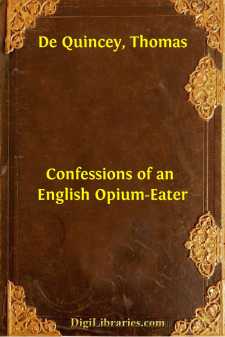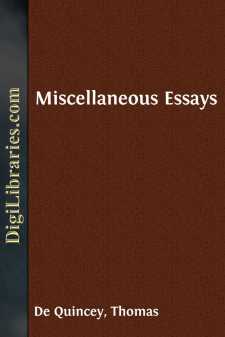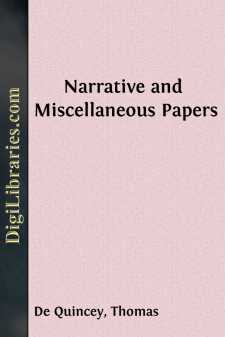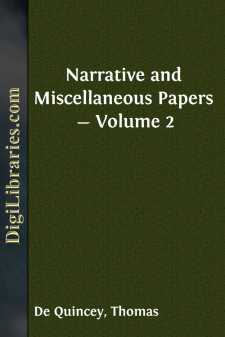Categories
- Antiques & Collectibles 13
- Architecture 36
- Art 48
- Bibles 22
- Biography & Autobiography 813
- Body, Mind & Spirit 142
- Business & Economics 28
- Children's Books 17
- Children's Fiction 14
- Computers 4
- Cooking 94
- Crafts & Hobbies 4
- Drama 346
- Education 46
- Family & Relationships 57
- Fiction 11829
- Games 19
- Gardening 17
- Health & Fitness 34
- History 1377
- House & Home 1
- Humor 147
- Juvenile Fiction 1873
- Juvenile Nonfiction 202
- Language Arts & Disciplines 88
- Law 16
- Literary Collections 686
- Literary Criticism 179
- Mathematics 13
- Medical 41
- Music 40
- Nature 179
- Non-Classifiable 1768
- Performing Arts 7
- Periodicals 1453
- Philosophy 64
- Photography 2
- Poetry 896
- Political Science 203
- Psychology 42
- Reference 154
- Religion 513
- Science 126
- Self-Help 84
- Social Science 81
- Sports & Recreation 34
- Study Aids 3
- Technology & Engineering 59
- Transportation 23
- Travel 463
- True Crime 29
Thomas De Quincey
Thomas De Quincey (1785-1859) was an English essayist best known for his autobiographical work, "Confessions of an English Opium-Eater," which explores his experiences with opium addiction and its impact on his life and work. A key figure in the Romantic movement, De Quincey's writings combine rich, lyrical prose with keen psychological insight. His contributions to literature also include critical essays and works on philosophy and political economy, influencing both his contemporaries and later writers.
Author's Books:
Sort by:
MY DEAR SIR: I am on the point of revising and considerably altering, for republication in England, an edition of such amongst my writings as it may seem proper deliberately to avow. Not that I have any intention, or consciously any reason, expressly to disown any one thing that I have ever published; but some things have sufficiently accomplished their purpose when they have met the call of that...
more...
SHAKSPEARE.[Endnote: 1] William Shakspeare, the protagonist on the great arena of modern poetry, and the glory of the human intellect, was born at Stratford-upon-Avon, in the county of Warwick, in the year 1564, and upon some day, not precisely ascertained, in the month of April. It is certain that he was baptized on the 25th; and from that fact, combined with some shadow of a tradition, Malone has...
more...
I here present you, courteous reader, with the record of a remarkable period in my life: according to my application of it, I trust that it will prove not merely an interesting record, but in a considerable degree useful and instructive. In that hope it is that I have drawn it up; and that must be my apology for breaking through that delicate and honourable reserve which, for the most part, restrains...
more...
INTRODUCTION. Thomas De Quincey is one of the eccentric figures in English literature. Popularly he is known as the English Opium-Eater and as the subject of numerous anecdotes which emphasize the oddities of his temperament and the unconventionality of his habits. That this man of distinguished genius was the victim—pitifully the victim—of opium is the lamentable fact; that he was morbidly shy and...
more...
VISIT TO LAXTON. My route, after parting from Lord Westport at Birmingham, lay, as I have mentioned in the "Autobiographic Sketches," through Stamford to Laxton, the Northamptonshire seat of Lord Carbery. From Stamford, which I had reached by some intolerable old coach, such as in those days too commonly abused the patience and long-suffering of Young England, I took a post-chaise to Laxton....
more...
Many of the papers in my collected works were originally written under one set of disadvantages, and are now revised under another. They were written generally under great pressure as to time, in order to catch the critical periods of monthly journals; written oftentimes at a distance from the press (so as to have no opportunity for correction); and always written at a distance from libraries, so that...
more...
CHAPTER I. The winter of 1633 had set in with unusual severity throughout Suabia and Bavaria, though as yet scarcely advanced beyond the first week of November. It was, in fact, at the point when our tale commences, the eighth of that month, or, in our modern computation, the eighteenth; long after which date it had been customary of late years, under any ordinary state of the weather, to extend the...
more...
ON THE KNOCKING AT THE GATE, IN MACBETH. From my boyish days I had always felt a great perplexity on one point in Macbeth. It was this: the knocking at the gate, which succeeds to the murder of Duncan, produced to my feelings an effect for which I never could account. The effect was, that it reflected back upon the murder a peculiar awfulness and a depth of solemnity; yet, however obstinately I...
more...
THE HOUSEHOLD WRECK. 'To be weak,' we need not the great archangel's voice to tell us, 'is to be miserable.' All weakness is suffering and humiliation, no matter for its mode or its subject. Beyond all other weakness, therefore, and by a sad prerogative, as more miserable than what is most miserable in all, that capital weakness of man which regards the tenure of his enjoyments...
more...
Some years ago, some person or other, [in fact I believe it was myself,] published a paper from the German of Kant, on a very interesting question, viz., the age of our own little Earth. Those who have never seen that paper, a class of unfortunate people whom I suspect to form rather the majority in our present perverse generation, will be likely to misconceive its object. Kant's purpose was, not...
more...











